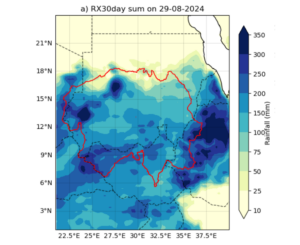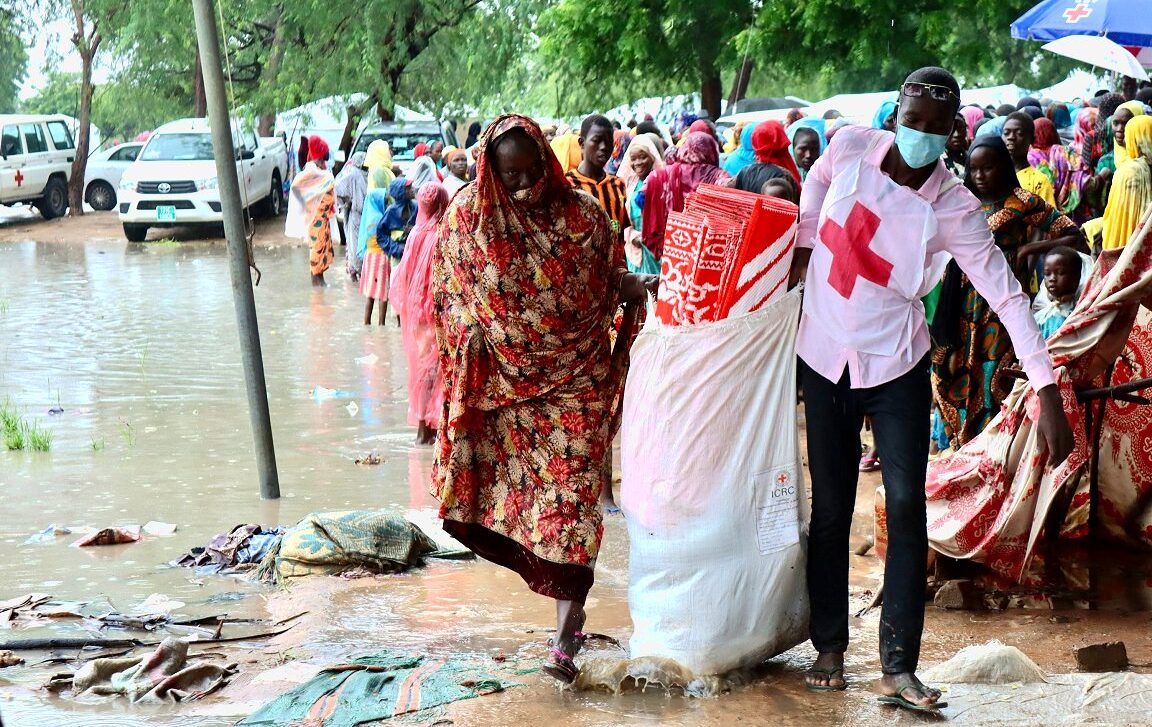The floods in Nigeria, Niger and Cameroon are nearly identical in timing and spatial extent to the floods that hit the same region at the same time of the year in 2022. Figure 1 shows a comparison between the two years. The figure highlights two regions, the Lake Chad Basin and the Niger Basin, for which the World Weather Attribution initiative undertook an attribution study at the time (WWA, 2022).
The study found that due to human-caused global warming, similar events are no longer rare, and are expected to become even more frequent with further warming. That study did not include Sudan, which was severely affected this year, with unprecedented amounts of rain in both the arid and semi-arid regions of the country. Repeating an analysis on the West Africa flooding would produce extremely similar results to the 2022 study, so this study focuses on Sudan.

To assess to what extent human-induced climate change altered the likelihood and intensity of the heavy precipitation leading to the severe flooding, researchers from Sudan, Egypt, Kenya, the Netherlands, Sweden and the UK undertook an attribution study on the event in Sudan. We also highlight below findings from the 2022 study that are relevant for the entire region.
In Sudan, the impacted areas were affected by persistent rainfall that occurred between June and August. We therefore studied changes in the wettest 30-day period over the study region, comprising the most impacted parts of the Nile and Bar el Ghazal river basins, between June and August (outlined in red in Figure 2). The regions to the east of the study region, which also experienced very heavy rainfall, are mountainous and have a very different climatology to the study region and therefore were not included in this study.

Main findings
- The severe floods of 2024 hit an extremely vulnerable region, and have significantly deepened a complex humanitarian crisis in Sudan, straining the capabilities of aid organisations and government bodies to respond.
- Similar to the findings for the Lake Chad and Niger Basin, the event in Sudan is not rare in today’s climate, which is 1.3°C warmer than it would have been at the beginning of the industrial period. An event of this magnitude is expected to occur about once every 3 years in Sudan, whereas the Lake Chad event had a return time of 10 years and the Niger event is expected on average once every 5 years.
- To assess if human-induced climate change influenced the heavy rainfall in Sudan, we first determine if there is a trend in the observations. Results showed that observed 30-day rainfall intensity has increased in intensity by about 18% since 1981 over the study region.
- To quantify the role of human-induced climate change we also analyse climate models over the relatively small study region. Overall, the available climate models indicate about a doubling in the likelihood of an event such as the one under study with about 10% increase in intensity. Although the uncertainty is large, the majority of the models indicate a trend toward more extreme precipitation events. Again, these results are comparable to the ones obtained in the Lake Chad and Niger Basin study, where we found similar changes for the Niger Basin, and an even larger increase due to human-induced warming for the Lake Chad Basin.
- Under a future warming scenario where the global temperature is 2°C higher than pre-industrial levels, climate models suggest that even wetter 30-day periods should be expected. Given that these events are not rare today, this means they will be common occurrences, and the region needs to prepare for much heavier events than those observed in 2024. These studies highlight that there is an urgent need to drastically improve water management and reduce vulnerability to seasonal rainfall.
- Ongoing conflict and fragility is acting as a risk multiplier, on top of the existing issues of poverty, rapid urbanisation, and ageing infrastructure. In particular, conflict has created a displacement crisis in the region with millions displaced in Chad, Nigeria and Sudan, living in makeshift shelters and at higher risk when extreme rainfall triggers flooding.
- The transboundary nature of the river systems in sub-saharan Africa requires coordination between neighbouring countries, which has been strained and hinders comprehensive flood management and early warning systems. Only a fraction of the population are known to have been aware of early warnings in the 2022 floods, likely to be the case in the 2024 floods. In addition, many of the same regions that were impacted by the 2022 floods had not fully recovered before they were hit again by the 2024 floods.
- The low return-period of the rainfall that resulted in such severe impacts underscores the chronic, deep vulnerabilities that are driving impacts. Together, these issues create a recipe for disaster, especially as even stronger rainfall events are to be expected in the future.
- To reduce flood risks, rehabilitation of damaged infrastructure should prioritise climate-smart design, including incorporating resilient materials and construction techniques and limiting construction in flood-prone areas. Effective water management, including maintaining and updating vital infrastructure like Arba’at, is crucial for mitigating both flood risks but also cascading risks on health. Finally, strengthening early warning systems by improving transboundary data sharing and ensuring greater access to warning and risk information, will be essential to reduce loss of life. World Weather Attribution






